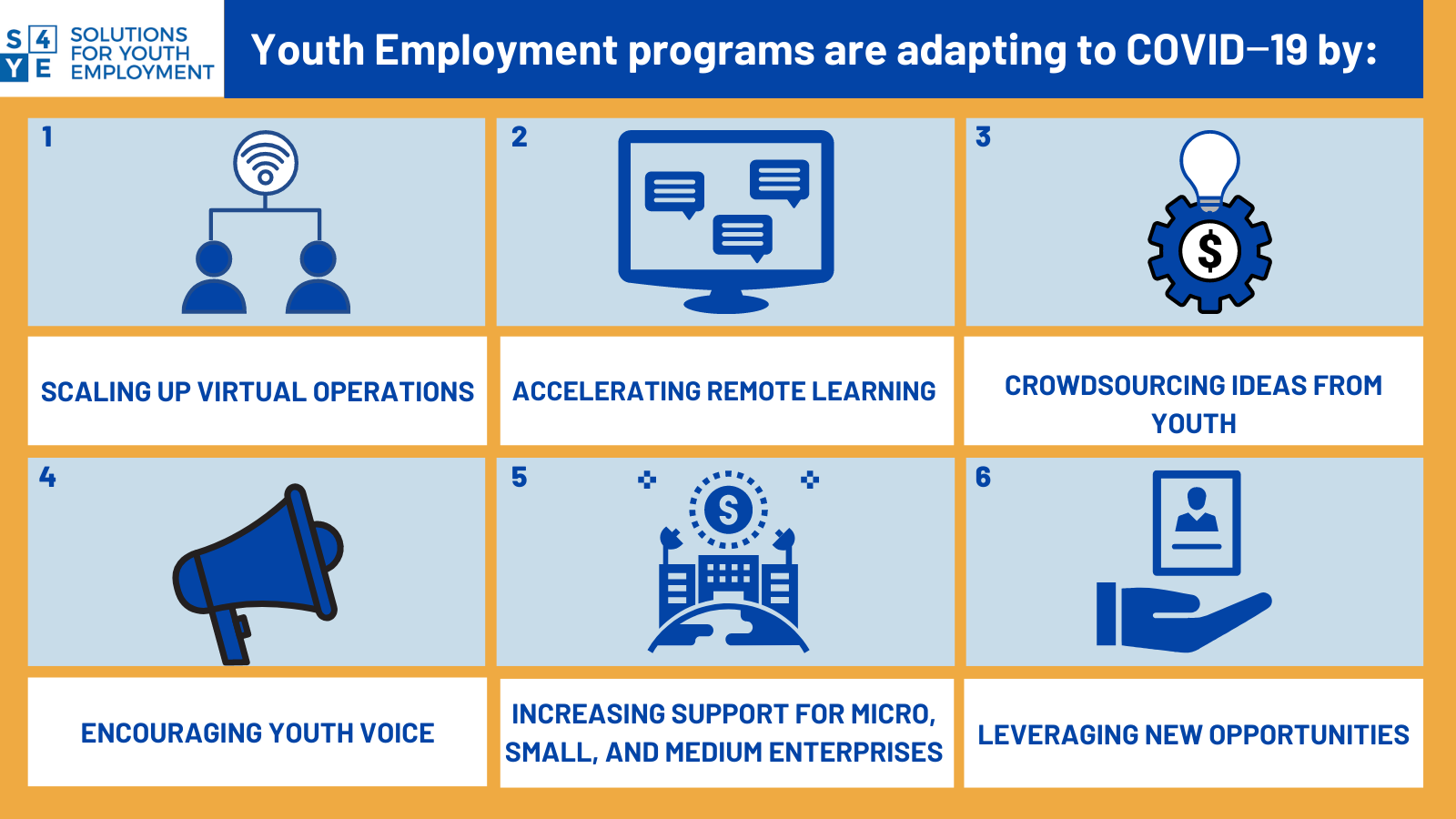 Deux personnes portant des masques faciaux pour aider à se protéger contre la propagation du coronavirus (Kenya). Photo : Banque mondiale / Sambrian Mbaabu
Deux personnes portant des masques faciaux pour aider à se protéger contre la propagation du coronavirus (Kenya). Photo : Banque mondiale / Sambrian Mbaabu
How are youth employment programs dealing with the COVID-19 pandemic and adapting their content and delivery models to ensure continued support to youth beneficiaries? Solutions for Youth Employment (S4YE) wanted to find out. So in the past few months, we’ve been in touch with our Impact Portfolio (IP) project partners, a community of practice of 44 innovative youth employment programs implemented by our partner organizations.
In our new S4YE Knowledge Brief, “How are Youth Employment programs adapting to COVID-19?,” we discuss six key trends we observed in the programs operated by our IP partners in response to COVID.
1. Accelerating remote learning
Organizations have modified their classroom content into more 'bite-sized,' self-paced, engaging learning modules. Visa, for example, is developing short bite-sized videos to provide essential highlights on topics within its financial literacy courses (like Practical Money Skills) to capture the attention of youth accessing the information on mobile phones. These videos direct users to other resources to obtain more in-depth information on a topic.
Additionally, IP partners have scaled mobile apps, SMS platforms, and radio programs to accelerate remote learning in rural communities for those who do not have access to computers. Harambee, a social enterprise from South Africa, is working with the United Nations to create data-light (less than 10MB) mobile courses for vulnerable populations like refugee youth. And Educate!, a nonprofit tackling unemployment in Africa, converted its educational programs to radio lesson scripts to be taught on local radio stations to reach communities with low broadband connectivity.
2. Scaling virtual operations
S4YE IP partners have transitioned operations to virtual formats for staff by increasing investment in technology tools, providing capacity-building support, and adapting HR policies to recognize off-site work. S4YE partner Accenture, a professional services company, has developed the Virtual Ways of Working Playbook, which offers practical advice to help nonprofits worldwide adapt to working virtually. ÁNIMA, an education company from Uruguay, is integrating artificial intelligence to automate processes like candidate selection for its work study program. The team developed a chatbot called "Animin" for WhatsApp to aid their registration process, which before COVID-19 was conducted through school visits and in-person workshops.
3. Crowdsourcing ideas from youth
Within the first few months of the pandemic, several S4YE IP projects developed crowdsourcing initiatives like hackathons and innovation challenges to support youth-led local solutions for new ideas to deal with the pandemic . For example, Ventures Platform Foundation, an Africa-wide business incubator and accelerator, supported the Nigeria Centre for Disease Control (NCDC) by identifying and scaling youth-led solutions for the national health care system that included an online self-administered risk-assessment tool, an AI-powered crisis response hotline, and a case management system designed to manage resource allocation by health care bodies.
4. Encouraging youth voices
Projects are creating safe digital spaces to encourage youth voice and to allow young people to collaborate and manage the impact of the crisis. For example, Empower Youth for Work (EYW), Oxfam's project, has developed a podcast called Power in the Pandemic to share young people's experiences during the COVID-19 crisis. The podcast highlights how youth from Pakistan, Ethiopia, Bangladesh, Canada, and Italy are harnessing their power to take localized action.
5. Supporting small enterprises with digital tools
Small businesses, which account for more than half of global employment, have been among the most affected by the pandemic. Many of these businesses lack the cash flow and capital necessary to see them through extended periods of reduced or no sales. COVID-19 has exacerbated the digital divide between bigger companies and small business – which often have limited digital tools . To overcome this, IP partners like Youth Business International are training small businesses in e-commerce, digital marketing, e-wallets integration, liaising with suppliers and delivery partners via virtual channels, and using social media tools for networking.
6. Identifying new, emerging job opportunities
The pandemic has seen the growth of new opportunities in the e-delivery service sector and the health sector. Grocers, pharmacies, and e-commerce marketplaces help sustain consumer access to essentials — food, medication, toiletries, etc. — and strive to keep customers, employees, and suppliers safe. In Kenya, Educate! developed for its mobile learning platform, NawiriPro, a specialized training for 'boda‒boda' motorcycle couriers and drivers. It helped equip youth with driving skills and the ability to use Google Maps. This agile, in-demand training's success led to increased income for youth (from $5 to $30 a day in some cases). The platform was recently selected by The Bill & Melinda Gates Foundation as one of two "accelerators" for 2020.
S4YE (Solutions for Youth Employment) is a multi-stakeholder global program housed in the Jobs Group of the Social Protection and Jobs Global Practice of the World Bank Group. It is focused on identifying, curating, learning from, and scaling innovations in youth employment programs. S4YE brings together a large network of stakeholders that includes: 1) over 35 private companies (S4YE Private Sector Advisory Council); 2) a group of 44 high-potential and innovative youth employment projects (S4YE Impact Portfolio) run by leading NGOs/social enterprises; 3) a group of 17 entrepreneurial youth (Youth Advisory Group) that provide youth voice on S4YE products; and 4) a network of World Bank Group technical staff running over 150 youth employment operations in 69 countries that together invest over $17 bn. The S4YE coalition’s founding members include the World Bank, Accenture, The Rockefeller Foundation, Mastercard Foundation, Microsoft, Plan International, International Youth Foundation (IYF), Youth Business International (YBI), RAND Corporation, the International Labour Organization (ILO), the Governments of Norway and Germany, and the UN Office of the Secretary-General’s Envoy on Youth.




Join the Conversation